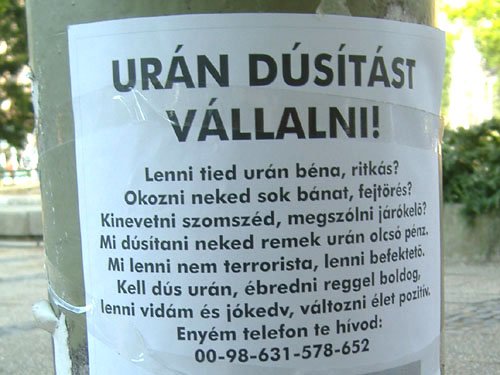

I think the left side scale is cm over 1m, so he would be 167cm, and the right scale is just a flustercuck.
Reddit refugee. Likes the Agora. Likes classical music. Flight simmer. No life.


I think the left side scale is cm over 1m, so he would be 167cm, and the right scale is just a flustercuck.


Zwischen uns.


wait until you see the immense disproportionality of the Hungarian voting system. MMP sounds nice, but the implementation makes it possible for our beloved leader to lose the popular vote and win 2/3 of the Parliament. 48% to 67% of seats. Lovely, eh? That was 2014. Unfortunately our demagogue brainwasher has now convinced 54% of voters the last time. And he won the exact same 2/3 sup.majority.


Unfortunately not because of an even worse version of the worst voting system in democracies: Fucked Past the Post.


No no, Orbán doesn’t want to be a dictator, he wants Fidesz to be the only party. You know this because he would hand over the PM post to Máté Kocsis any time and you know he would because Máté acted like a sack of shit in the pardon scandal.
But yes. The govt is bullshitting its way through being a dictator.


Hungarian here. tf??? Tbf, basically everyone here says “haha the western dollar-media doesn’t understand our government/people/culture und und und”. Even Opposition voters.
Also, Orbán is only the third or second worst option. We also have actual Neo-Nazis in parliament, thankfully not yet to AfD/right extreme FPÖ levels.


I’ve heard and used sh.itheads too


I really like me a good serif. Computer (Latin) Modern is very satisfying. Also, according to some research, it’s up there with the Helveticas and the Arials for readability. Note that 12-point is where serifs flourish (figuratively).


Newer research actually says that it mostly doesn’t matter. Use a readable sans or serif, there’s no measurable difference.[1][2][3]
[1] Wery, J.J., Diliberto, J.A. The effect of a specialized dyslexia font, OpenDyslexic, on reading rate and accuracy. Ann. of Dyslexia 67, 114–127 (2017). https://doi.org/10.1007/s11881-016-0127-1
[2] Kuster, S.M., van Weerdenburg, M., Gompel, M. et al. Dyslexie font does not benefit reading in children with or without dyslexia. Ann. of Dyslexia 68, 25–42 (2018). https://doi.org/10.1007/s11881-017-0154-6
[3] Rello, L., Baeza-Yates, R. How to present more readable text for people with dyslexia. Univ Access Inf Soc 16, 29–49 (2017). https://doi.org/10.1007/s10209-015-0438-8


For young people, No. 1 is becoming pretty clear, although parents influence is a thing.
For a bit older people up to gen X, it’s “yeah sure but the opposition isn’t better” (which it is, but everyone is homophobic) or “playing two sides is smart” not realising how fucking cynical that is today.
For even older people, ie retirees, it’s that Fidesz ramps up retirement pay close to every election like a pet-owner playing with their dogs.
Note that what is now the Opposition had a speech recorded in 2006, where the party Leader, Ferenc Gyurcsány, openly said “We have lied through the last eight years” and “We fucked this [very vulgar version]. Not a little, [we’ve fucked this] a lot”. Orbán is obviously lying way more but he doesn’t say it out loud (Or is smart enough not to get it recorded).


If you want ice scraped off the pavement in russia, just write Навальный [Naval’nyy] on it.


IT bubonic plague





Hungary presents: grep --kis--és-nagybetűk-figyelmen-kívül-hagyása
Yeah that is a resounding no. PS: I am not exaggerating. That is the first translation that came into mind
because (I firmly believe that) it won’t get passed. The Commission doesn’t have a majority yet, and it will be laughed out of the EUP. EVEN IF the EUP votes to pass it, the ECJ ought to step in, because the UNCHR and the European Data Protection Supervisor have already said that it goes against the (human(!)) right of privacy. There is no shot that this will get implemented by 27 member states.
In Hungary, this is our finest art.
Fairly fucking sure this is a nothingburger like Art. 13-17 was, and will not break E2EE messengers.
The reason:
Encryption plays an essential role in securing communications. The international human rights law test of legality, necessity and proportionality should be applied to any measures that would affect encryption. Both the UN Commissioner for Human Rights[1]and the European Data Protection Supervisor[2]have concluded that the EU’s proposal for a regulation on child sexual abuse material fails this test[3].
A recent article published by Wired[4]described a European Council survey of Member States’ views on regulating encryption. In its response to the survey, Spain stated that there should be legislation prohibiting EU-based service providers from implementing end-to-end encryption.
Requiring platforms and device manufacturers to build back doors to facilitate law enforcement access would make everyone more susceptible to malicious hacking from criminals and foreign adversaries alike[5]. Measures allowing public authorities to access the content of communications affect the essence of the right to privacy.
1.Which encryption experts did the Commission consult when preparing its proposal for a regulation on child sexual abuse material?
2.Will the Commission revise its position on encryption in view of the opinions of human rights associations and experts?
3.Given the abuse of Pegasus, how will the Commission ensure that the fundamental right to privacy is protected if a Member State, such as Spain, decides to ban encryption?
Submitted: 24.5.2023
[1] UN High Commissioner for Human Rights, ‘The right to privacy in the digital age’, A/HRC/51/17, 4 August 2022, para. 28, https://www.ohchr.org/en/documents/thematic-reports/ahrc5117-right-privacy-digital-age.
[2] https://edps.europa.eu/press-publications/press-news/press-releases/2022/combat-child-sexual-abuse-online-presents-serious-risks-fundamental-rights_en.
[3] https://home.crin.org/readlistenwatch/stories/privacy-and-protection.
[4] https://www.wired.com/story/europe-break-encryption-leaked-document-csa-law/.
[5] https://cdt.org/area-of-focus/government-surveillance/encryption-and-government-hacking/.
Source: https://www.europarl.europa.eu/doceo/document/E-9-2023-001661_EN.html (EUP Parliamentary question E-001661/2023)
So yeah, it is now established that forcing law enforcement on E2EE messaging services goes against human rights. glhf EUC


O God, the hash one isn’t bad, just stop there for the sake of all that is holy
Actually rational take?? Holy hell